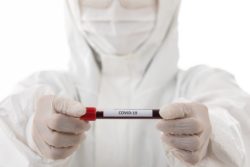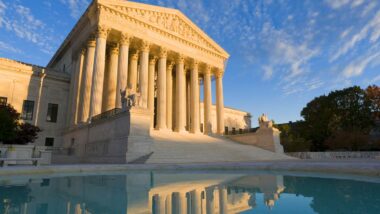Top Class Actions’s website and social media posts use affiliate links. If you make a purchase using such links, we may receive a commission, but it will not result in any additional charges to you. Please review our Affiliate Link Disclosure for more information.
Coronavirus info texts may not be exempted under TCPA if they are sent for telemarketing purposes, according to federal regulators.
What Is the TCPA Emergency Exemption?
The Telephone Consumer Protection Act (TCPA) is a federal law that protects consumers from unwanted robocalls and spam texts. The law is effective at protecting consumers but, since its passing, the Federal Communication Commission (FCC) has included a TCPA emergency exemption to allow calls made for “emergency purposes.”
The FCC defines “emergency purposes” as “calls made necessary in any situation affecting the health and safety of consumers.” This would include “instances [that] pose significant risks to public health and safety, and [where] the use of prerecorded message calls could speed the dissemination of information regarding . . . potentially hazardous conditions to the public.”
Are Coronavirus Updates Included in the TCPA Emergency Exemption?
On March 20, the FCC released a declaratory ruling ensuring public health officials that any updates will be covered under the TCPA emergency exemption. The regulator specifically noted that “hospitals, health care providers, state and local health officials, and other government officials” can feel free to lawfully communicate vital information about the coronavirus pandemic.
In justifying their ruling, the FCC noted that several state governors and even the country’s president have declared the COVID-19 outbreak to be an emergency. As a result, public areas are being closed, businesses are being limited, and several other precautions are being taken. Further measures may be taken which will likely require communications from various officials and authorities.
“A critical component of the nation’s efforts to address and contain this health-related emergency is the ability of health care and public safety organizations to communicate effectively with the public,” the FCC argued.
What Kind of Coronavirus Info Is Legal For Companies to Text About?
Although the FCC’s declaratory ruling gave the green light for coronavirus info calls and texts, the agency did give specific criteria for coronavirus communications covered by the TCPA emergency exemption.
First, the FCC ruled that the caller or text sender must be hospital-related, a healthcare provider, a state or local health official, another government official, or someone acting under the express direction of these people or organizations.
Second, the FCC requires that the content of any automated robocalls or mass texts must meet various guidelines. The only allowed messages should be “solely information,” be made necessary due to the COVID-19 outbreak or relate directly to the health or safety risk from the pandemic.
For example, hospitals are allowed to call patients to provide vital and time-sensitive health information, such as coronavirus test results. For another example, health officials are allowed to send robocalls or automated text messages to update citizens about the pandemic and various public measures that must be followed.
What Additional Measures Did the State of New York Take Regarding Telemarketing Calls?

In February 2019, New York amended its general business law to add a statute regarding the state’s Do Not Call List regarding telemarketing maneuvers during a state of emergency. The law says:
It shall be unlawful for any telemarketer doing business in this state to knowingly make an unsolicited telemarketing sales call to any person in a county, city, town, or village under a declared state of emergency as described in sections twenty-four or twenty-eight of the executive law. New York GBS 399-z(5-a)
Because the word “unsolicited” is used in the statute, the statute appears to allow telemarketing calls if the telemarketer received prior consent from the recipient.
In addition, New York’s Telemarketing and Consumer Fraud and Abuse Prevention Act now contains similar language, but does not include several types of calls, such as phone calls to for-profit businesses.
New York’s state of emergency is scheduled to expire on Sept. 20, 2020.
Other states that have laws affecting the business of telemarketing during a state of emergency include Louisiana and West Virginia. The latter prohibits calls regarding false or deceptive information related to a proclaimed state of emergency, and violators can be fined $5,000 and/or serve up to a year in jail. West Virginia Governor Jim Justice declared a state of emergency because of COVID-19 on March 16, 2020.
Should You File a Coronavirus TCPA Lawsuit?
Although important updates are allowed to be communicated to consumers during the coronavirus pandemic, companies who take advantage of the situation may be held liable under the TCPA.
Telemarketing text messages which reference COVID-19 are not excused under the federal law simply because they reference the virus. Whether these texts are sent to advertise grocery delivery, cleaning services, health insurance, or other services, they will not be covered by the TCPA emergency exemption.
The FCC’s declaratory ruling explicitly addresses that these communications and notes sent by telemarketers and debt collectors will not be allowed to run rampant while the coronavirus pandemic is ongoing.
“Unscrupulous callers should not view the relief we provide here as a retreat from our aggressive work to combat illegal robocalls,” the FCC noted in the TCPA declaratory ruling. ”We are aware that some consumers have already received telemarketing and fraudulent robocalls related to the pandemic.”
“We will be vigilant in monitoring complaints about these calls and will not hesitate to enforce our rules when appropriate,” the FCC concluded.
The FCC has also warned that robocalls or texts about coronavirus scams are also not exempted from TCPA liability. According to the regulator, these calls and text messages may aim to take advantage of fear surrounding the coronavirus pandemic with fake cures, tests, or other offers.
If you received coronavirus info texts or calls which are not covered by the TCPA emergency exemption, you may be able to file a coronavirus TCPA class action lawsuit. TCPA allows consumers to collect up to $1,500 in statutory damages for each violation. Even if a TCPA lawsuit doesn’t go to trial, settlements reached with companies can provide significant compensation for consumers affected by unsolicited spam texts and robocalls.
Join a Free Coronavirus TCPA Class Action Lawsuit Investigation
If you received unsolicited coronavirus texts, robocalls, or pre-recorded messages, you may be eligible to join a FREE coronavirus TCPA class action lawsuit investigation.
This article is not legal advice. It is presented
for informational purposes only.
ATTORNEY ADVERTISING
Top Class Actions is a Proud Member of the American Bar Association
LEGAL INFORMATION IS NOT LEGAL ADVICE
Top Class Actions Legal Statement
©2008 – 2024 Top Class Actions® LLC
Various Trademarks held by their respective owners
This website is not intended for viewing or usage by European Union citizens.
















4 thoughts onDoes the TCPA Emergency Exemption Include Coronavirus Info?
Please ad me. I have been negatively affected by the Covid19 economic crisis/pandemic
Please Add Me!! Thank You…….
add me
add me please